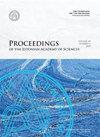Daily nursing activities in relation to patient well-being: a serial cross-sectional study
IF 0.7
4区 综合性期刊
Q3 MULTIDISCIPLINARY SCIENCES
引用次数: 0
Abstract
. Regardless of the health status, patient well-being is important. Well-being is a broad concept ranging from traditional biomedical views to a holistic view of health that includes physical, psychological, social and religious factors. When a person is ill or has a chronic disease, well-being is affected and is thus linked to any health-related life experience. Ensuring and enhancing well-being is one of the main goals of nursing. This quantitative cross-sectional study aimed to evaluate the relationship between the time spent on physical, psychological, social and religious nursing activities, and the achievement of goals set by nurses in their daily work in terms of patient well-being in Estonia. The study was conducted in three stages: in 1999 (study I), 2009 (study II) and 2021 (study III). A total of 904 nurses participated in these three consecutive studies: study I, n = 490; study II, n = 204; and study III, n = 210. The inclusion criteria were a nursing profession and a work experience of at least one year. In conclusion, the proportion of somatic, mental, social and religious problems among patients increased. Inclusive, universal and comprehensive nursing activities were essential in achieving patient well-being. Nurses considered the achievement of goals characteristic of physical nursing as the most important aspect of their daily work, followed by mental and social nursing activities. The contribution of religious nursing activities was noticeably limited. Whether patient well-being could be achieved by directing nursing activities towards physical nursing remained unclear. The study was a systematic and comprehensive overview of the development of nursing care in Estonia and aimed to contribute to improving patient well-being by planning nursing activities.日常护理活动与病人健康的关系:一项连续横断面研究
. 不管病人的健康状况如何,病人的幸福都是重要的。幸福是一个广泛的概念,从传统的生物医学观点到健康的整体观点,包括身体、心理、社会和宗教因素。当一个人生病或患有慢性疾病时,幸福就会受到影响,因此与任何与健康有关的生活经历有关。确保和增进健康是护理的主要目标之一。这个定量的横断面研究旨在评估在身体,心理,社会和宗教护理活动中花费的时间之间的关系,以及护士在爱沙尼亚患者福祉方面的日常工作中设定的目标的实现。研究分三个阶段进行:1999年(研究一)、2009年(研究二)和2021年(研究三),共904名护士参加了这三个连续的研究:研究一,n = 490;研究II, n = 204;研究III, n = 210。纳入标准为护理专业和至少一年的工作经验。综上所述,患者中躯体、精神、社会和宗教问题的比例有所增加。包容、普遍和全面的护理活动对实现患者健康至关重要。护士认为身体护理目标的实现是其日常工作中最重要的方面,其次是心理和社会护理活动。宗教护理活动的贡献明显有限。是否病人的福祉可以实现指导护理活动对物理护理仍然不清楚。该研究是爱沙尼亚护理发展的系统和全面概述,旨在通过规划护理活动促进改善患者福祉。
本文章由计算机程序翻译,如有差异,请以英文原文为准。
求助全文
约1分钟内获得全文
求助全文
来源期刊

Proceedings of the Estonian Academy of Sciences
综合性期刊-综合性期刊
CiteScore
1.80
自引率
22.20%
发文量
24
审稿时长
>12 weeks
期刊介绍:
The Proceedings of the Estonian Academy of Sciences is an international scientific open access journal published by the Estonian Academy of Sciences in collaboration with the University of Tartu, Tallinn University of Technology, Tallinn University, and the Estonian University of Life Sciences.
The journal publishes primary research and review papers in the English language. All articles are provided with short Estonian summaries.
All papers to be published in the journal are peer reviewed internationally.
The journal is open to word-wide scientific community for publications in all fields of science represented at the Estonian Academy of Sciences and having certain connection with our part of the world, North Europe and the Baltic area in particular.
 求助内容:
求助内容: 应助结果提醒方式:
应助结果提醒方式:


